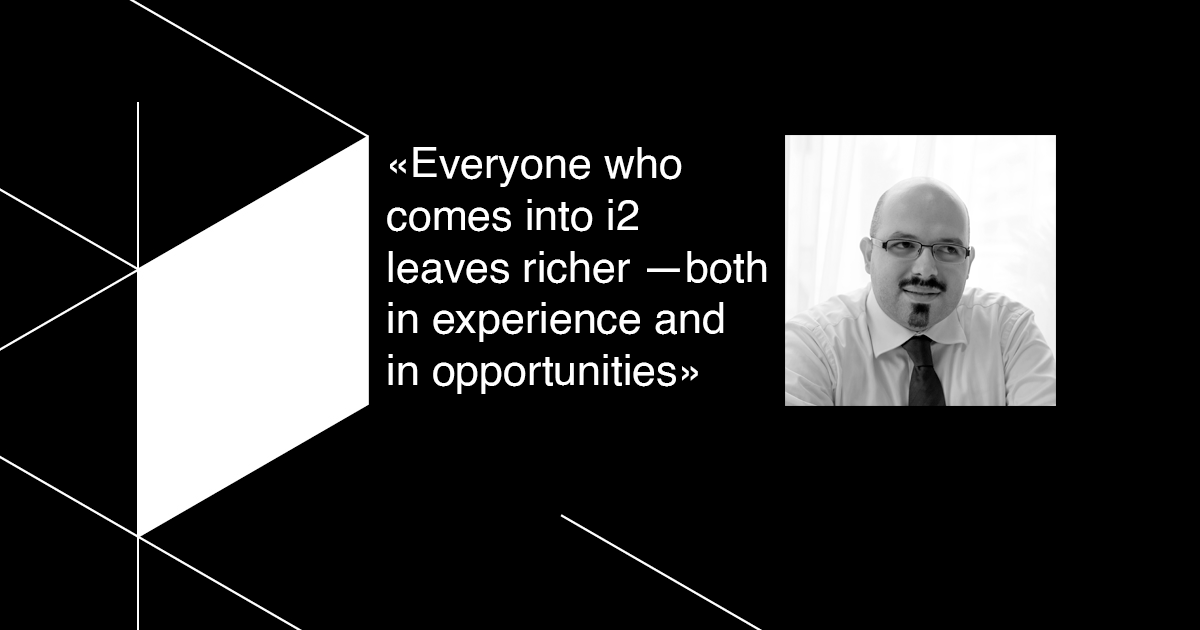«Everyone who comes into i2 leaves richer —both in experience and in opportunities»

A conversation with Matteo Vignoli on measuring the impact of education
On a quick stop from his daily working routine, Matteo cheerfully accepts to answer our questions on his "beloved" IdeaSquare —a project he believed on from the very beginning. A committed member of ATTRACT and an active editor of IdeaSquare's Journal of Innovation, he is now trying to figure out the success of IdeaSquare's Challenge-Based Innovation Programme to replicate it in his home university in Bologna.
Q. Matteo, you were one of the first collaborators of IdeaSquare. What are you currently doing there?
A. Besides coordinating the Challenge-Based Innovation Programme, I'm running a thesis with one of my students on tangibly calculating the impact that students generate in companies after finishing their stay at IdeaSquare. We are now collecting the data for the last two years and trying to define the value of i2’s Challenge-Based Innovation Programme, and how do companies perceive this. I will use this data for the editorial piece of the next CIJ issue.
So, you are kind of like “quantifying” the impact of studying at IdeaSquare.
Exactly. This student interviewed managers and students involved in seven projects and discovered that the impact of I2 is in relation to the organization's innovation goals and the organization's ability to learn a new innovation methodology. These results could be relevant to improve the characteristics of a product/service/system, to solve a problem, or to develop innovative solutions, either to be exploited internally or to be launched on the market. At the same time, organizations often decide to use these results for other purposes, such as educating company members on human-centered design or to orient the company culture toward a new approach based on innovation and experimentation.
Interesting. And why do you think this is?
Well, IdeaSquare has this wonderful ability to connect scientists with society. For example, Elahe Rajabiani, one of the CBI past coordinators, always said that she had been positively “contaminated” by everything happening at IdeaSquare. She loved the multidisciplinary mix between science, arts, SDGs, the technologies… And she used this varied approach also in her research. Also, Silvia Marchini, another CBI coordinator, was absolutely fascinated by the scientists’ interactions happening at IdeaSquare. In her case, that crystallized into developing different tools to facilitate the encounter between students, companies, and scientists. If you ask me, everyone who comes into IdeaSquare leaves richer —both in experience and in opportunities.
Did you actually develop something at IdeaSquare?
Yes, we did. We launched this tool called Science2Technology (S2T), a different way to create scenarios that foster collaboration between scientists, technicians, and students. Another development is the so-called “tech-cards”, a resource that aims to “rephrase” scientistic language into a “comprehensible” narrative that regular people, students, and companies can actually understand. At the end of the day, IdeaSquare is a place where, if you have an idea —however random—, you will be welcome.
Is there anything that you haven’t done yet?
Many things! I’m exploring the possibility of doing something in the field of food —the food of the future. It may be something related to social activism, a scientific tool that left an impact on local ecosystems. Food is the start of many things and IdeaSquare could be the perfect place to connect food and science. And, of course, there is ATTRACT, our next challenge, which I’m sure will soon bring amazing new solutions and services to society.
What would you do if you had unlimited resources to invest in IdeaSquare?
I would try to replicate its technology transfer model to different research centers around Europe —at least, this is what I am currently trying to do in Bologna. And probably try to open the space to more universities, especially those with fewer means to send their students to CERN. Last but not least, I would love to develop further ways to connect the scientific community with students and companies.
Matteo Vignoli is an assistant professor in Management Science and Engineering at the University of Bologna and Academic Director of BBS React Innovation Program and Corporate Digital & Innovation Management Programme. He is also the operative coordinator of the Bologna Factory for Open Innovation. He is a founding member of the Challenge-Based Innovation initiative at IdeaSquare. He is currently part of the Editorial Board of CERN IdeaSquare Journal of Innovation, CIJ.